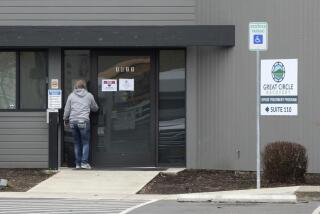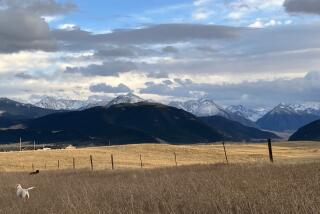Burned-Out Baby Boomers Move to Bend, Ore., to Get the Kinks Out
- Share via
BEND, Ore. — The first time Collins Hemingway saw the snowcapped Three Sisters mountains, he was recently divorced and driving west with his toddler son to take a job as a copy editor at an Oregon newspaper.
After helping the newspaper make the jump to computerized editing, Hemingway took a leap himself, landing a job at a public relations firm to help create an image for an upstart software company called Microsoft.
After 18 years in high-tech public relations and marketing--seven with Microsoft, where he capped his career collaborating with Bill Gates to write “Business @ the Speed of Thought”--Hemingway has done what a lot of people who tapped into booming stock options have done: retired before they burned out.
“I probably had better odds of being struck by lightning than ending up where I am now,” says Hemingway, 49, who grew up poor in Arkansas after his father ran out. Now he’s sitting in the living room of a custom home with a sweeping view of those same Three Sisters he fell in love with driving west.
The high desert of central Oregon attracts a lot of people like Hemingway: People who have worked hard in a boom economy that rewarded them with wealth. People who have decided work means more than just making money and retirement doesn’t mean putting their feet up.
Hemingway is looking forward to writing a novel instead of speeches for Gates, getting involved in his community instead of jetting around the world, and doing a little consulting and investing while still having time to backpack through those spectacular mountains.
“All my life I’ve worked hard solving problems for other people, at work other people wanted me to do,” he says. “What is going to be nice, for what I hope will be the next 20 or 30 years, is not that I will be sitting around the swimming pool drinking margaritas, but that I will be doing work I want to do.”
Like the ‘49ers who rushed to California for gold, people who have already struck it rich rush to Bend to find another elusive element: joy. Between 1990 and 1997, Bend and surrounding Deschutes County grew 34%, to just over 100,000 people--three times the overall state growth rate.
A 30-year resident, developer Bill Smith almost qualifies as a native. In 10 years, he has seen a lot of people like Hemingway move to Bend as it morphed from a dying timber town to an L.L. Bean-lifestyle boomtown by hooking successful people who like to play in the great outdoors. There is world-class skiing, fly-fishing, golf courses and wide-open spaces.
“It’s not just affluence that causes it,” Smith says. “It’s a willingness of people right now to not chase monetary rewards.
“Maybe it’s because job movement among companies is now accepted, firms are offering sabbaticals, those kinds of things,” he says. “Now it’s OK to move to Bend, Ore., and live there and get by on significantly less than you would if you applied yourself in a city like Seattle or Detroit.”
Like a lot of other folks, Marc Blank and his wife, Cezanne, fell in love with Bend after skiing Mt. Bachelor. They moved here before bothering to figure out how to make a living.
He had graduated from MIT and medical school but gave up plans to be a doctor and moved to Los Angeles to design computer games.
It didn’t take long to tire of L.A.
He began in Bend by doing some freelance work and consulting before enlisting a partner from a previous company to start Eidetic, a computer game outfit still basking in the success of a million-seller, “Syphon Filter.”
“Everyone working for me is doing well, but everyone could do better,” Blank says. “What they get is a place that is more matching to their temperaments. We tend to keep people a long time because they have made a life decision.”
Another Bill Smith, not related to the developer, found that he was not really satisfied after working so hard for success on Wall Street, then starting a financial advisory firm with his wife in Westport, Conn.
“We probably had the best of that lifestyle,” Smith recalls of his life in Connecticut. “Our business was successful. We were our own bosses. And we lived in the town we worked in. But it wasn’t serene. Horns honked. People wrestled over parking spaces. Most of our friends were commuting to New York.”
What they wanted most, he says, was easy access to recreational activities. “One winter we rented a ski condo in Vermont, but it took six hours to get there. It seemed that as soon as we got there, we had to turn around and get home.”
Looking around the country, they found Colorado too boring, Florida too hot, New England too cold. Bend was just right, with no waiting list for the tennis club and lots of other people just like them.
Though they had put away enough to retire, with two growing sons and people who knew their background asking for financial advice, Smith and his wife, Linda Zimbalist, restarted their firm.
But in this life, Smith wears T-shirts and sweatpants to work instead of suits. Instead of a BMW, he drives a four-wheel-drive pickup.
While his friends back in Connecticut are riding the train home from Wall Street, he spends summer evenings practicing softball with a bunch of other 50-somethings. He also volunteers at a ranch for troubled boys.
“I’ve got, for the first time, playmates,” Smith says. “We have no desire to leave and will probably stay here forever.”
More to Read
Inside the business of entertainment
The Wide Shot brings you news, analysis and insights on everything from streaming wars to production — and what it all means for the future.
You may occasionally receive promotional content from the Los Angeles Times.










